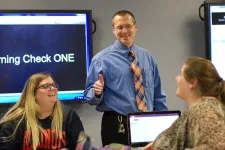But if this CAR-T treatment fails, or the cancer returns yet again — as happens in approximately half of people — the prognosis is dire. The median survival time after relapse is about six months.
Now, a phase 1 clinical trial at Stanford Medicine has found that a new CAR-T cell therapy that targets a different protein on the surface of the cancer cells significantly improved these patients’ outcomes: Over half of 38 people enrolled in the trial — 37 of whom had already relapsed from the original CAR-T therapy — experienced a complete response of their cancers. More than half of all treated patients lived at least two years after treatment.
“On average, the patients enrolled in this trial had received four previous lines of therapy,” said assistant professor of medicine and the trial’s principal investigator Matthew Frank, MD, PhD. “These patients are out of likely curative options, and they are scared. Half of them will die within five to six months. But in this trial, we saw a very high rate of durable complete responses, meaning their cancers became undetectable.”
‘Breakthrough therapy’
The original CAR-T therapy, approved by the Food and Drug Administration in 2017, involves removing immune cells from the patient and inserting a gene to help the cells attack a protein called CD19 on the surface of the lymphoma cells. The new version of the therapy instead targets a molecule called CD22.
In September 2022, the FDA designated CD22-targeting CAR-T therapy for large B-cell lymphoma a Breakthrough Therapy, a move that is meant to speed the development and review of particularly promising drugs that may provide a substantial improvement over existing therapies for serious conditions.
The study was devised and conducted entirely at Stanford Medicine.
“This trial was an example of what it means to take an idea from preclinical studies in animals all the way into the patient at an academic medical center,” said David Miklos, MD, PhD, professor of medicine and chief of bone marrow transplantation and cellular therapy. “Remarkably, the FDA — after reviewing our preliminary data — contacted us to urge us to apply for breakthrough therapy designation, rather than waiting for us to approach them. This will help us significantly as we move into larger clinical trials.”
A larger, phase 2 trial led by Frank is now ongoing at multiple sites around the country.
Miklos is the senior author of the study, which will be published July 9 in The Lancet. Frank; assistant professor of medicine John Baird, MD; and postdoctoral scholar Anne Kramer, MD, PhD, are the lead authors of the research.
CAR-T cell therapy was first approved by the FDA as a treatment for relapsed or treatment-resistant diffuse large B-cell lymphoma and for children and young adults under 25 with acute lymphoblastic leukemia.
Six CAR-T cell therapies are now approved for several types of lymphoma, multiple myeloma and acute lymphoblastic leukemia. Four of these therapies target CD19, which is found on the surface of healthy and cancerous B cells; two target another protein on the cells’ surface called B cell maturation agent.
CD22 is another protein found on the surface of mature B cells, and researchers have been eying it for some time as a possible second target for CAR-T cell therapy. That’s because, although CAR-T cell therapy targeting CD19 is typically successful, many patients relapse quickly as the cancer cells figure out how to reduce the amounts of CD19 on their surfaces or their engineered immune cells become exhausted from a prolonged attack.
Several trials have experimented with engineering CAR-T cells that recognize both CD19 and CD22 — exploring whether a double volley of attack might eliminate cancer cells before they learn how to evade the treatment.
These efforts have met with mixed success. While more people with acute lymphoblastic leukemia responded to the double-targeted CAR-T therapy, the results for people with lymphoma were more tempered. In a trial conducted at Stanford Medicine, the therapy had some efficacy but was no more effective than targeting CD19 alone. Frank, Miklos and their colleagues wondered what would happen if only CD22 were targeted.
A new target
The researchers collected immune cells called T cells from 38 patients with large B-cell lymphoma whose cancers had started growing after previous therapies including chemotherapy. All but one of the patients had also progressed after CAR-T therapy targeting CD19; the cancer cells of the one remaining patient did not express CD19 on their surfaces.
The T cells were grown and genetically engineered to target CD22 in Stanford Medicine’s Laboratory for Cell and Gene Medicine in partnership with the Center for Cancer Cell Therapy. They were then infused back into the patients from whom they were derived.
Of the 38 patients, 68% saw their cancers shrink, and 53% achieved a complete response, meaning their cancers were no longer detectable.
“This is not just a high response rate, but many of these remissions have been quite durable over a median of 30 months of follow-up,” Frank said. “If this holds true in larger trials, it will surpass other therapeutic option we have for these patients.” Additionally, most patients experienced minimal, manageable side effects.
The results of the trial are the first in a series of hurdles CD22-targeted CAR-T cell therapy will have to clear for it to be approved by the FDA for routine clinical use for those with intractable large B-cell lymphoma. According to Miklos, it also highlights the advantages of intertwining medicine and research.
“We conducted the preclinical studies at Stanford Medicine, translated the findings in our cell manufacturing and cancer cell therapy centers, and cared for the patients here,” Miklos said. “This pipeline allows us to leverage our research and clinical findings in an iterative way. If something is not working, we can refocus and retool our approach to pivot quickly to new approaches to help our patients.”
“It is rare for an academic medical center to attain a breakthrough designation,” Frank noted. “It’s humbling. Larger trials need to be completed, and FDA approval is not guaranteed, but this is a huge achievement for all the members of the team and a hopeful sign for patients and their caregivers.”
Researchers from Chang Gung Memorial Hospital at Linkou, Taoyuan, Taiwan and Cancer Center Amsterdam, who are currently working at Stanford, contributed to the work.
The study was funded by the National Institutes of Health (grants 2P01CA049605-29A1, 5P30CA124435 and K08CA248968), the Virginia and D.K. Ludwig Fund for Cancer Research, the Parker Institute for Cancer Immunotherapy, the European Hematology Association, the Lymph&Co Foundation, and the Leukemia and Lymphoma Society.
Miklos has consulted for Kite Pharma-Gilead, Juno Therapeutics-Celgene, Novartis, Janssen and Pharmacyclics. Research support from Kite Pharma-Gilead, Allogene, CARGO Therapeutics, Pharmacyclics, Miltenyi Biotec and Adaptive Biotechnologies.
Frank has consulted for Kite Pharma-Gilead, Adaptative Biotechnologies and CARGO Therapeutics; he has also received research support from Kite-Pharma-Gilead, Allogene Therapeutics, Cargo Therapeutics and Adaptative Biotechnologies.
Study co-author Crystal Mackall, MD, the Earnest and Amelia Gallo Family Professor and professor of pediatrics and of medicine, is a founder of CARGO Therapeutics and holds equity in and consults for the company. CARGO holds the license for the CD22-directed CAR-T cell therapy.
# # #
About Stanford Medicine
Stanford Medicine is an integrated academic health system comprising the Stanford School of Medicine and adult and pediatric health care delivery systems. Together, they harness the full potential of biomedicine through collaborative research, education and clinical care for patients. For more information, please visit med.stanford.edu.
END



